The Everest Base Camp Trek is a renowned journey that allows adventurous trekkers to enjoy the captivating world of the Himalayas. This 16-day trek not only offers breathtaking mountain vistas but also provides an authentic cultural experience by introducing participants to the vibrant Sherpa community. Priced at a reasonable $2,275.95 per person, the trek includes guided tours, a thrilling flight, and nourishing meals, making it a suitable challenge for trekkers of varying skill levels. With the promise of acclimatization days, scenic landscapes, and a memorable sunrise, this trek is sure to leave a lasting impression on those who embark on this once-in-a-lifetime adventure.
Key Points
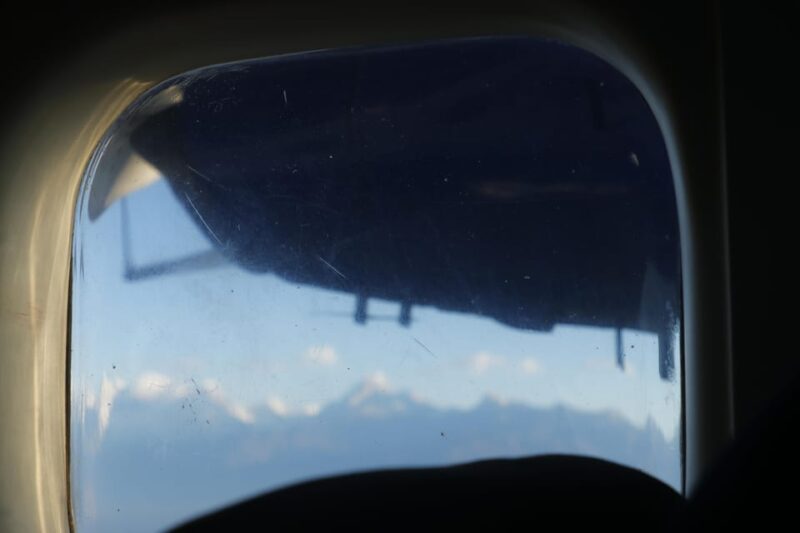
- The Everest Base Camp Trek is a legendary 16-day journey through the Himalayas, offering breathtaking views and immersion in Sherpa culture.
- The trek includes a guided tour of Kathmandu, flights to Lukla, and acclimatization days for a safe and successful ascent.
- The cost of the trek is $2,275.95 per person and includes accommodations, meals, permits, and various equipment.
- The trek is suitable for all skill levels, but individuals with certain health conditions may not be recommended to participate.
- Proper preparation, including gear, physical training, and understanding local protocols, is essential for a safe and enjoyable Everest Base Camp Trek.
Trek Overview and Highlights
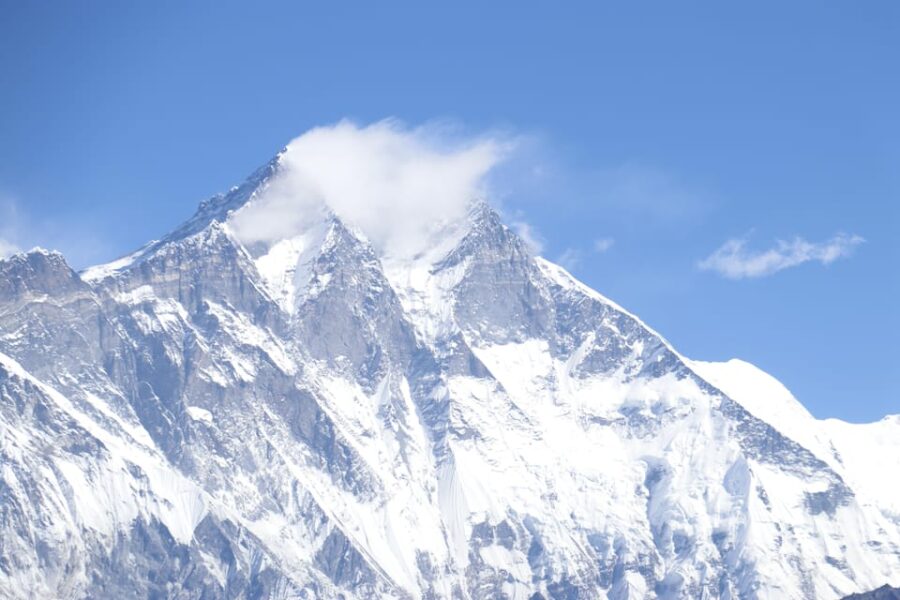
The Everest Base Camp Trek is a legendary journey through the stunning Himalayas, offering breathtaking views of the world’s highest peaks, as well as the opportunity to take in the rich Sherpa culture.
This 16-day trek typically costs $2,275.95 per person and features a guided tour of Kathmandu, a thrilling flight to Lukla, and exploration of remote mountain villages and waterfalls.
Highlights include witnessing the sunrise from Kala Patthar and experiencing the unique lifestyle and customs of the mountain people.
With free cancellation up to 24 hours in advance, this private group trek led by an English-speaking guide is an unforgettable adventure for trekkers of all skill levels.
Ready to hit more trails? More hiking adventures we feature in Koshi Zone
Itinerary Outline
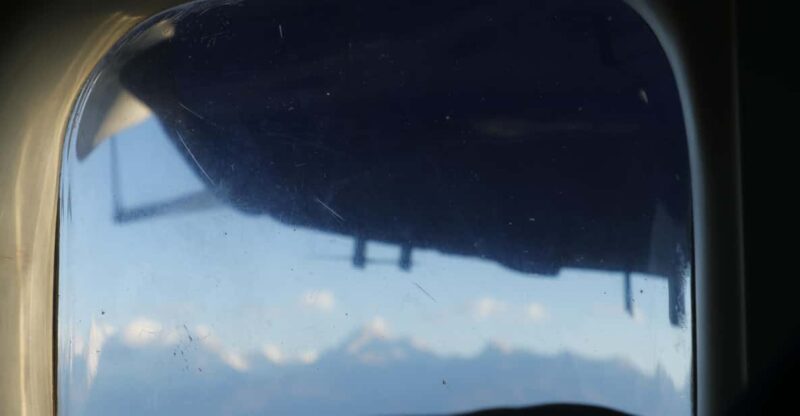
The 16-day itinerary for the Everest Base Camp Trek begins with arrival in Kathmandu, where travelers embark on an excursion to explore the city’s art, architecture, and history.
The next day, they’ll fly to Lukla and trek for 3-4 hours to reach Monjo.
Over the following days, they’ll ascend to Namche, Tengboche, and Dingboche, with acclimatization days built in.
The trek continues to Lobuche, Gorak Shep, and the Everest Base Camp, before descending through Pangboche, Namche, and Lukla.
Inclusions and Services
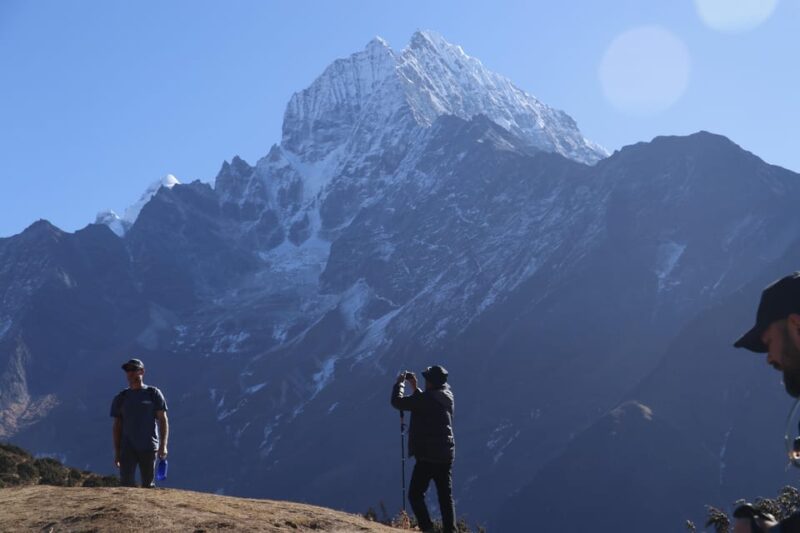
As part of the Everest Base Camp Trek package, travelers can expect airport pick-up and drop-off by private vehicles, a welcome dinner with a cultural show at a Nepali restaurant, and a guided Kathmandu Valley excursion with private transportation.
Accommodation is provided for 3 nights in Kathmandu with breakfast, and 11 days of full-board meals during the trek. The package includes round-trip flights from Kathmandu to Lukla, as well as tea house accommodations, a professional English-speaking trekking guide, and porter service for two trekkers.
Necessary permits, entrance fees, a medical kit, t-shirt, trip map, souvenir cup, and duffel bag are also included.
Exclusions and Important Notes
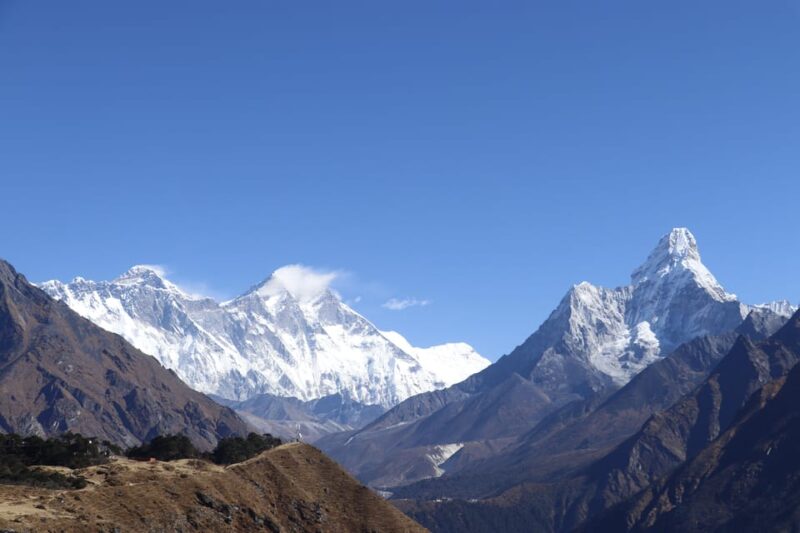
While the Everest Base Camp Trek package covers a wide range of inclusions, there are several exclusions and important notes travelers should be aware of.
For starters, the cost doesn’t include international flight tickets or city sightseeing entrance fees.
Plus, travelers must obtain a Nepal arrival visa and secure their own travel/rescue insurance, which is mandatory.
More Great Thing To Do NearbyHealth and Safety Considerations
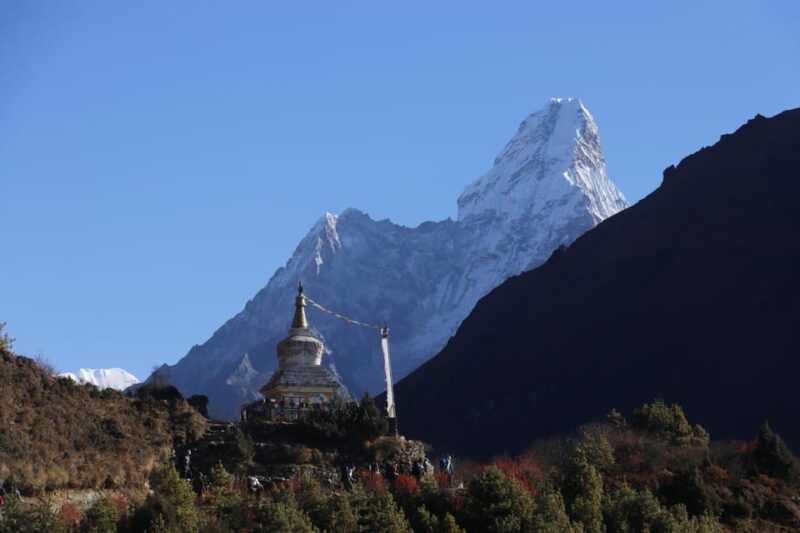
Individuals with certain medical conditions may not be suitable for the Everest Base Camp Trek. The trek poses physical and altitude challenges that could exacerbate pre-existing health issues. Travelers with back problems, mobility impairments, claustrophobia, heart conditions, vertigo, respiratory problems, epilepsy, or other medical concerns are advised against participating. Plus, the trek is not recommended for babies under 1 year or individuals over 95 years old.
| Not Suitable | Suitable |
|---|---|
| Back problems | Healthy individuals |
| Mobility impairments | Experienced trekkers |
| Claustrophobia | Fit and active travelers |
| Heart problems | Adaptable to high altitude |
| Vertigo | Mentally and physically prepared |
Destination Highlights
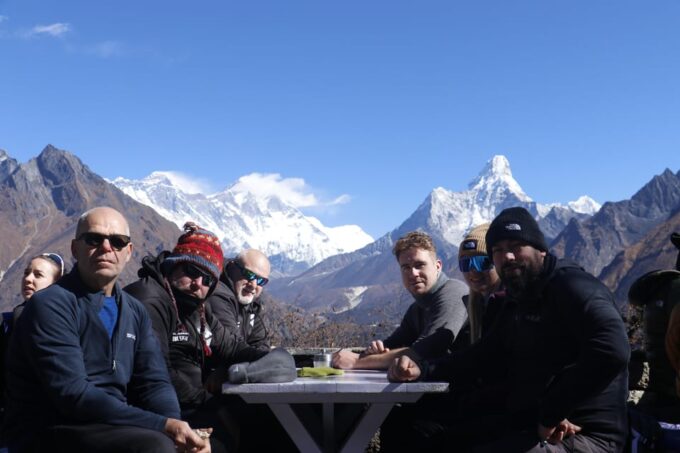
The Everest Base Camp Trek offers a legendary journey through the captivating Himalayan landscape, immersing trekkers in breathtaking views of the world’s highest peaks.
Highlights of this iconic trek include:
- The thrill of flying into Lukla Airport, with aerial panoramas of snow-capped mountains.
- Exploring remote mountain villages, encountering the vibrant culture and lifestyle of the Sherpa people.
- Witnessing the stunning sunrise from Kala Patthar, offering unparalleled vistas of the mighty Everest.
Throughout the trek, trekkers will be mesmerized by the serene waterfalls, lush valleys, and spiritual monasteries that dot the landscape, creating an unforgettable adventure in the heart of the Himalayas.
Packing and Preparation
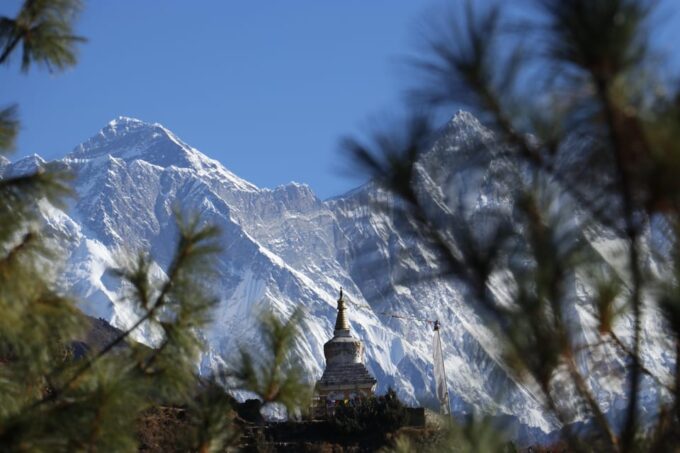
How does one effectively prepare for the Everest Base Camp Trek? Proper packing and preparation are essential for a successful and enjoyable journey. Trekkers should invest in high-quality, lightweight gear that can withstand the elements. A detailed packing list should include technical clothing, sturdy hiking boots, warm layers, and essential toiletries. It’s also crucial to train physically by building endurance and strengthening the lower body. Acclimatization is key, so a gradual ascent and rest days are recommended. Travelers should also familiarize themselves with the local culture, language, and safety protocols. With meticulous planning and the right gear, trekkers can embark on this once-in-a-lifetime adventure with confidence.
| Essential Gear | Recommended Items |
|---|---|
| Clothing | Thermal base layers, fleece jackets, waterproof shells, hiking pants, comfortable socks |
| Footwear | Sturdy, broken-in hiking boots, trekking poles, gaiters |
| Personal Items | Water bottle, snacks, headlamp, sunscreen, lip balm, first-aid kit |
| Documents | Passport, visa, travel insurance, vaccination records |
Booking and Cancellation
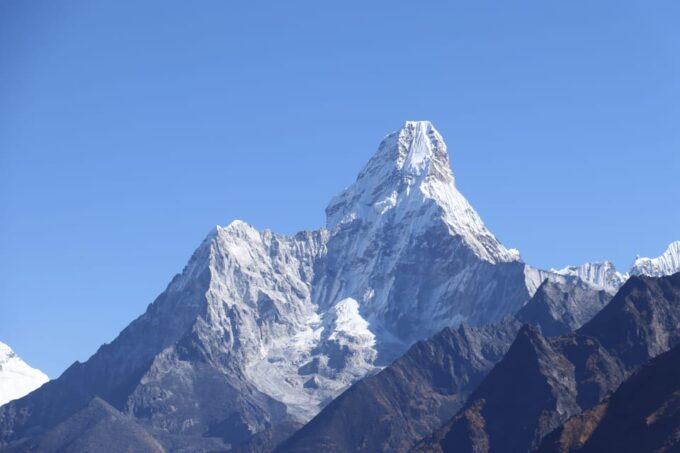
Booking the Everest Base Camp trek is a straightforward process, typically done through a reputable tour operator.
Cancellation policies are also quite flexible, with most companies offering a full refund up to 24 hours before the start of the trek.
Some key points to consider:
-
Free Cancellation: Many operators provide a free cancellation option up to 24 hours in advance, allowing for a full refund of the trek cost.
-
Flexible Rescheduling: In case of unforeseen circumstances, most operators offer the flexibility to reschedule the trek for a later date, often without additional fees.
-
Travel Insurance: Purchasing comprehensive travel insurance is highly recommended to protect against potential cancellations or interruptions due to medical emergencies or other unforeseen events.
Frequently Asked Questions
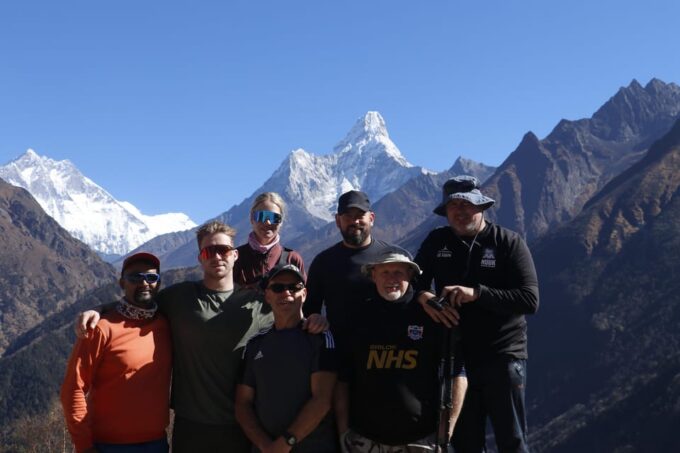
What Is the Best Time of Year to Do the Everest Base Camp Trek?
The best time to embark on the Everest Base Camp trek is during the spring (March to May) or autumn (September to November) seasons. These periods offer clear skies, moderate temperatures, and the optimal conditions for trekking through the magnificent Himalayas.
How Much Weight Will I Need to Carry During the Trek?
Trekkers typically carry a daypack weighing 5-10 pounds, containing essentials like water, snacks, and layers. Porters or pack animals transport the remaining gear, averaging 15-20 pounds per person. Careful packing ensures a comfortable trek without excessive loads.
Can I Rent Equipment On-Site or Do I Need to Bring Everything?
Trekkers can rent most basic equipment like sleeping bags, down jackets, and trekking poles on-site, but it’s recommended to bring your own personal gear like hiking boots, daypacks, and hydration systems for comfort and familiarity during the trek.
Are There Any Age or Fitness Restrictions for the Trek?
The trek has certain age and fitness restrictions. It’s not suitable for individuals under 1 year old, over 95 years old, or those with medical conditions like back problems, mobility issues, or respiratory issues. Participants must meet minimum fitness requirements.
What Happens if I Need to Evacuate During the Trek?
If a trekker needs emergency evacuation, the tour company will coordinate with local authorities and private helicopter services to conduct a rescue. The cost of the evacuation is not included and is the responsibility of the trekker.
Recap
The Everest Base Camp Trek offers an unparalleled opportunity to take in the majestic Himalayan landscape and Sherpa culture. With its well-curated itinerary, inclusive services, and consideration for health and safety, this trek caters to adventurers of all skill levels. Whether seeking stunning mountain views or a personal challenge, the Everest Base Camp Trek promises an unforgettable journey that will create memories to last a lifetime.
You can check if your dates are available here:More Tour Reviews in Koshi Zone
Not for you? Here's more things to do in Koshi Zone we have recnetly reviewed
- 4 Best Tours In Koshi Zone
- 4 Best Helicopter Flights And Tours In Koshi Zone
- 4 Best Hiking And Trekking Tours In Koshi Zone
- Private Luxury Everest View 5 Days Heli Tour
- Everest Base Camp Overnight Stay Trek – 15 Days
- Kathmandu Everest Helicopter Tour With Guranteed Landing
- From Lukla: Mera Peak (6,476m) Climbing
- Island Peak (6,189m) Climbing
- Kanchenjunga Circuit Trek – 21 Days
- 19 Days Lobuche East Peak With Everest Base Camp Trek
- Exclusive 3-Hour Everest Helicopter Landing Tour
